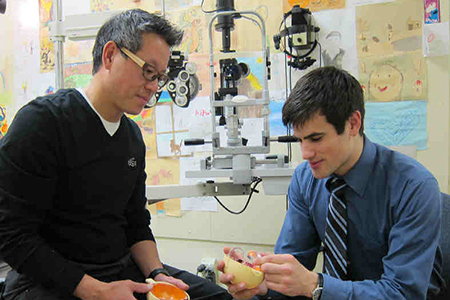“We’re getting away from the formal laboratory environment. We’re trying to focus engineering around hands-on, project-based learning… and how to solve problems in a team environment,” says Ted Batchman, dean of the college of engineering at the University of Nevada, Reno.
Engineering is a diverse field of study, ranging from building satellites in aerospace programs to designing polymers at the chemical level. But at its core, engineering is about solving problems. Every day, there’s a new discovery in science or technology. Engineers answer the question: How do we use those breakthroughs to benefit society? If you have an answer, or would have fun finding one, then engineering is for you.
“There’s something unique in engineering: you build something and afterwards you can point to it and say, ‘I built that.’ You have ownership over that project for the rest of your life,” says Howard Dunn, department chair of engineering at the United States Coast Guard Academy.
The basic principles of engineering can be put into use to solve practically any problem. However, once the degree of difficulty increases beyond the basics, the realm of engineering splits into many specialized fields. At today’s colleges, there are nine standard concentrations for engineering majors: chemical, mechanical, aerospace, industrial, civil, structural, electrical, computer and biomedical. Most schools allow students to wait until their second or third year to select a major, so you have some time to decide.
There are some basic things you can do while in high school to prepare for college, no matter what type of engineering field you decide to enter.
How Do I Prepare for Engineering While I’m in High School?
Nearly every expert will tell you that academic preparation, particularly in mathematics, is essential to succeeding in engineering at the college level and beyond.
“I personally believe that any student in high school who wants to major in engineering must improve their mathematical understanding,” says Hossein Rahemi, professor at Vaughn College of Aeronautics and Technology.
If you’re considering applying to engineering programs, then high-level math courses are a must. If your school offers honors-level classes, take them. But don’t be dissuaded if the district doesn’t—there are always area community colleges willing to take on an enthusiastic high-schooler or two. They often hold courses at night or offer them over the summer.
Still, preparing for (and getting into) the school of your choice isn’t merely about hard work inside the classroom. More and more, universities are looking beyond academics. There are plenty of opportunities for extracurricular experiences to beef up your resume, give you a taste of what engineering is all about and enhance your college application.
Some of the biggest opportunities for hands-on experience come in the form of contests, like the annual FIRST Robotics Competition (www.usfirst.org). In the FRC program teams of high school students design robots to compete in regional events. Whether it’s an FRC challenge or not these types of contests are regularly available to high school students.
“These kinds of activities are really really important,” says Bob Nichols, director of external affairs for Kettering University. “Through them students can find out if they’re interested in engineering.” If your school doesn’t offer programs like these think about job shadowing or applying for internships at local engineering firms. Often being in the field and seeing first-hand the different types of engineering can help you nail down the career field you’ll want to enter.
What Are Engineering Classes Like?
It’s a broad question and one that each university will answer quite differently. While you’re on pre-college visits to schools that offer engineering ask faculty and students to give you a specific answer so you can choose the program that’s the right fit.
Generally speaking the first two years of any program consist of fundamental core classes in math and science. After that students have the opportunity to take higher-level courses in the branch of engineering that most interests them.
Just because you’re not taking classes in your desired concentration right away doesn’t mean you can’t gain valuable experience. The college world is full of hands-on clubs and programs for engineering students.
“One of the great benefits nowadays is that there are so many extracurricular activities in engineering that students can get involved in,” says John Olivero, professor of engineering physics at Embry-Riddle Aeronautical University. “Students can get involved with building automobiles airplanes robots and all sorts of things.”
“Students at Embry-Riddle have the opportunity to participate in annual NASA-sponsored student competitions. They compete in teams for the chance to conduct experiments on the famous “Vomit Comet” — NASA’s aircraft used to train astronauts to work in a zero-gravity environment.
There are many other opportunities for hands-on team-based projects. Formula SAE a program launched almost 30 years ago is a worldwide competition (http://students.sae.org/competitions/formulaseries). Collegiate teams design build and race Formula 1-type cars. The Society of Automotive Engineers which oversees the competition recently launched an offshoot challenge where teams build gas-electric automobiles. The second annual Formula Hybrid Competition was held this past May. (Now given today’s skyrocketing gas prices helping design fuel-efficient hybrid vehicles is a better idea than ever.)
Many schools such as Kettering University and Wentworth Institute of Technology have mandatory cooperative programs. In a co-op schools pair students with a company where the students receive first-hand experience in their fields. These programs are a terrific way to gain real work experience and training while you’re still in college. Often they can even lead to a job offer before you graduate.
What Are the Current Trends in Engineering?
Because engineering combines science and technology to find answers to our biggest problems the field continually evolves with every discovery. Divisions between types of engineering are erased as cooperation between the various sciences leads to innovative solutions.
“All of the trends not just [in] engineering but science and technology as well are to allow as much interdisciplinary activity as possible in whatever field you’re studying,” Olivero says. Perhaps no area is evolving faster than biomedical engineering. For example recent innovations in carbon-fiber technology and prosthetic allowed double-amputee South African sprinter Oscar Pistorius the chance to compete for a spot in the 2008 Olympic Games. And the engineering touch extends to the most complex machine of all — the human body — as advances in bio-materials allow scientists to grow living tissue and develop artificial organs.
Right now one of the hottest engineering fields is a combination of several areas of engineering: mechanics. Basically students take fundamental parts of each discipline combine them and discover how they might design “smarter” machines. While some in the field design artificial robotic exoskeletons for military and industrial use others work on everyday products such as anti-lock brakes computer disk drives and even washing machines.
Average Starting Salaries for Engineers by Degree
| ENGINEERING MAJOR |
BACHELORS AVERAGE OFFER |
MASTERS AVERAGE OFFER |
DOCTORATE AVERAGE OFFER |
|---|---|---|---|
| Aerospace / Aeronautics | $53,408 | $62,459 | $73,814 |
| Bio & Biomedical | $51,356 | $59,240 | n/a |
| Chemical | $59,361 | $68,561 | $73,667 |
| Civil | $48,509 | $48,280 | $62,275 |
| Computer | $56,201 | $60,000 | $92,500 |
| Electrical | $55,292 | $66,309 | $75,982 |
| Environmental | $47,960 | n/a | n/a |
| Materials | $56,233 | n/a | n/a |
| Mechanical | $54,128 | $62,798 | $72,763 |
| Nuclear | $56,587 | $59,167 | n/a |
| Source: National Association of Colleges and Employers” 2007 Salary Survey |
Perhaps the most significant problem facing society (and therefore providing the biggest opportunity for engineers) is in the field of energy development. “We need renewable sources of energy” which is directly related to the carbon dioxide issue and the climate,” Batchman says. “I think this will be one of the major issues facing engineering.”
The search for fossil fuel alternatives influences many of the advances in the civil engineering field but it hasn’t eliminated new research into better production methods for the fuels we currently do use. Schools like the University of Alaska Fairbanks specialize in mining petroleum and geological engineering and their graduates often go on to work for large oil companies inventing new ways of extracting natural resources in a more environmentally-friendly manner.
“There aren’t a whole lot of universities in the country that still offer anything in the way of mining or geological engineering,” says Doug Goering, dean of the Fairbanks College of Engineering and Mines. “But it’s a very hot field at this point with the prices of energy and minerals these days.” Colleges are reacting to environmental problems and the depleting of natural resources by finding ways to preserve our planet. They’re developing new programs to educate students. For example the University of Nevada Reno has introduced a new renewable energy minor. Engineering programs also offer courses in alternative energy. These programs are not limited to engineering students as half of the classes are filled with political science majors. But the goal for all involved is the same: solving the energy problem.
The Need for Engineers Is Greater than Ever
Engineering is a challenging field for all who choose to enter and the demand for innovation has never been higher than it is today.
“There is fierce competition developing for students with aptitude in science technology engineering and math,” says Devadas Shetty, dean of the college of engineering at Lawrence Technological University. “Shortages are likely to appear as the engineers of the baby-boomer generation approach retirement age.”
For many engineering can be a rewarding and also lucrative career. While the almighty dollar shouldn’t be the only motivating factor you should know that on average engineers are quite successful (see chart on page 58 for average starting salaries). Each year the Department of Labor publishes a study forecasting trends. In the latest edition all engineering fields showed potential for significant growth — both in numbers of workers and in wages. Hard work is always necessary for success but there are plenty of jobs out there in whatever engineering field you choose.
Engineering requires intelligence dedication and most of all passion. If you choose engineering you will be given the biggest problems in society to solve — energy medicine sustainability and infrastructure.
That’s a big challenge but also, a huge opportunity for future engineers. Are you ready?



